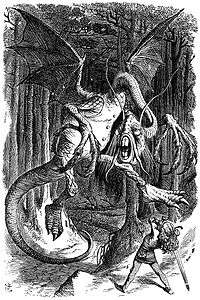Jabberwocky
Jabberwocky [ˈdʒæbəˌwɒki]? is de titel van een beroemd nonsensgedicht van Lewis Carroll uit het boek Through the Looking Glass (1871). Een groot deel van de gebruikte woorden zijn door de schrijver bedacht. Het gedicht krijgt zijn werking door de combinatie van onomatopee en porte-manteaus.

De illustratie bij Jabberwocky door John Tenniel
Een vader waarschuwt zijn zoon voor drie dieren die de omgeving onveilig maken, in het bijzonder voor de Jabberwock. De jongen gaat met een zwaard eropuit en slaagt erin de Jabberwock te doden. Thuis wordt hij met vreugde ontvangen.
Een vertaling in traditionele zin is niet mogelijk, maar er zijn wel diverse herdichtingen in allerlei talen.[1]
Drie van die "vertalingen" zijn in het Nederlands:
- "De krakelwok" door Ab Westervaarder & René Kurpershoek
- "Wauwelwok" door Alfred Kossmann & C. Reedijk (1947)
- "Koeterwaal" door Nicolaas Matsier.
Tekst
- 'Twas brillig, and the slithy toves
- Did gyre and gimble in the wabe:
- All mimsy were the borogoves,
- And the mome raths outgrabe.
- "Beware the Jabberwock, my son!
- The jaws that bite, the claws that catch!
- Beware the Jubjub bird, and shun
- The frumious Bandersnatch!"
- He took his vorpal sword in hand:
- Long time the manxome foe he sought—
- So rested he by the Tumtum tree,
- And stood awhile in thought.
- And, as in uffish thought he stood,
- The Jabberwock, with eyes of flame,
- Came whiffling through the tulgey wood,
- And burbled as it came!
- One, two! One, two! And through and through
- The vorpal blade went snicker-snack!
- He left it dead, and with its head
- He went galumphing back.
- "And hast thou slain the Jabberwock?
- Come to my arms, my beamish boy!
- O frabjous day! Callooh! Callay!"
- He chortled in his joy.
- 'Twas brillig, and the slithy toves
- Did gyre and gimble in the wabe:
- All mimsy were the borogoves,
- And the mome raths outgrabe.
| Bronnen, noten en/of referenties |
This article is issued from
Wikipedia.
The text is licensed under Creative
Commons - Attribution - Sharealike.
Additional terms may apply for the media files.